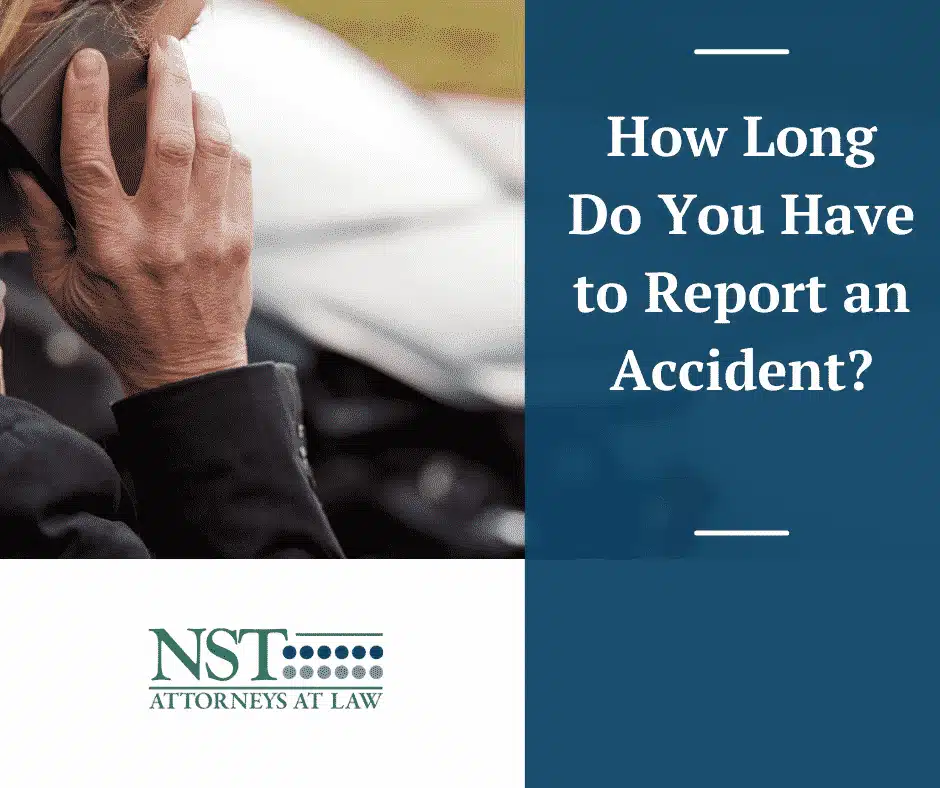If you’ve been involved in a car accident, you probably have a lot of questions. Immediately after the wreck, your biggest concern is likely everyone’s safety. Next, you’re probably wondering if you should call the police or if you have to report the car accident to your insurance company and how long you have to do so.
The laws for reporting accidents to law enforcement vary from state to state. However, your insurance company may have a specified window of time for reporting accidents in order for you to receive coverage. When in doubt, it’s always best to inform your insurance company as soon as you’re able.
After reporting the accident, don’t forget to seek legal advice from an experienced personal injury attorney. The team at NST Law can help ensure you receive compensation for the injuries and other losses you suffered.

Filing a Police Report
A police report is the official documentation of your car accident. It’s an unbiased, professional accident record and usually attributes causality to one or both parties.
The police report is often necessary for your insurance company to approve your claim. It’s also needed if you aren’t to blame for the accident and plan to pursue a lawsuit for damages against the at-fault party.
The police report will include the following information:
- The place, date, and time of the accident
- Damage to the cars involved
- Injuries to drivers, passengers, or passers-by
- Witness statements and statements of accounts from both drivers
Even if you’re the at-fault driver, it’s still important to have a police report. If the other driver attempts to exaggerate the extent of their injuries or the amount of damage to their car, having official documentation of the facts protects you from being liable for a fake injury claim.
Each state has different requirements for filing a police report after an accident. If you don’t comply with regulations in your state, you could incur fines or other consequences, such as having your driver’s license or vehicle registration suspended. You may also invalidate your insurance policy for not reporting the accident.
Tennessee
Tennessee Code §55-10-106 requires drivers to report any accident to the police that results in more than $50 in property damage or in injury or death.
Illinois
If an accident results in the injury or death of another person, then it must be reported to the police within 30 minutes.
Mississippi
Per Mississippi Code section 63-3-411, you must report any accident that causes $500 of damage or more, or one that results in injury or death, to the police in Mississippi.
Missouri
MoRS § 303.040 states that drivers must report a car accident to the police within one year if there was property damage of $500 or more or if someone was injured or killed. If the police didn’t respond to the scene, you must report it to the local police station.
Arkansas
You must report a car accident to the police if there was more than $1,000 worth of property damage or if a driver, passenger, or pedestrian was injured.
Reporting to Other State Agencies
Some states require drivers to report accidents to other state agencies like the DMV or treasury departments. The requirements per state are broken down below.
Tennessee
The Tennessee Department of Safety and Homeland Security requires a car accident report to be filed within 20 days of the incident.
Illinois
The Illinois Department of Transportation requires that car accidents be reported within 10 days of the incident.
Mississippi
The Mississippi Department of Public Safety requires all car accidents to be reported within 10 days if someone is hurt or the property damage exceeds $250.
Missouri
You must report accidents in Missouri to the Driver’s License Bureau within one year. Even if the accident didn’t cause personal injury, death, or property damage over $500, you still must report it if it involved an uninsured motorist.
Arkansas
The Arkansas Department of Finance and Administration requires a Safety Responsibility SR-1 accident report to be submitted within 30 days of the accident when property damage exceeds $1,000 or any person is injured or killed.
Reporting an Accident to Your Insurance Company
Your insurance policy will have a specified length of time to report the accident. The typical time limit to report the accident to your insurance company is 30 days, although some carriers and policies may have different time limits.
The time that you have to report a claim to your insurance company is different from the statute of limitations to file a lawsuit against the other driver.
If you were the only driver involved in the accident, you should submit a claim to your own insurance company to cover repairing or replacing the vehicle, plus your medical bills.
If you were involved in an accident with another driver, you still need to report it to your insurance company, but make sure to include a copy of the police report. Your insurance company may not cover a claim if it’s clear that another party was responsible.
If you’re involved in an accident with an uninsured motorist, you will also need to submit a claim with your insurance company. However, for insurance to pay for the damage to your car and your medical bills, you’ll need to have an uninsured/underinsured motorist policy in addition to your regular one.
How do I obtain a copy of the police report?
The police report often contains both the officer’s analysis of the conditions of the scene and witness statements, so it may not be available at the time of the accident.
However, many states now offer accident reports online. You may need the first and last name of one or both parties involved and the time, date, and location of the accident. Check with your local police department’s website for information on accessing your accident report.
What if I fail to report an accident in a timely manner?
Fines, license suspension, and possible jail time are all typical consequences for not reporting an accident within the time frame stipulated by your state.
In addition to consequences from the police, you’ll also face consequences from your insurance company if you fail to report an accident. Many companies will deny a claim filed outside their time frame for reporting. In addition, if you were at fault for the accident and didn’t report it, the insurance company may cancel your policy.
However, each policy is different, so check yours and call your insurance agent if you aren’t sure what you need to report and when.
Finally, if you aren’t at fault for the accident and you plan to file a claim for damages against the other party, you’ll need to file your suit within your state’s statute of limitations. The time frames for filing a lawsuit often differ by state and between claims for property loss and damage and claims for personal injuries.
How can the personal injury attorneys at NST Law help me after a car accident?
An experienced personal injury lawyer who knows the laws for your state will ensure that your documents are filed on time. It’s always best to contact an attorney as soon as possible to file your insurance claim or lawsuit within the designated timeframes after an accident.
Your lawyer can also compile the supporting documents you need for a successful claim, including medical records and doctor’s recommendations for aftercare, police reports and witness statements, and documentation from your employer about lost wages or diminished working capacity.
Not all personal injury lawyers are the same. Trust your case to the experienced team at NST Law. Our history of successful verdicts and settlements speaks for itself, and our client testimonials offer insight into how your experience working with NST Law will go.
The Six Pillars of NST Law demonstrate our commitment to our clients. We are your advocates, and we strive to develop relationships based on trust, compassion, and accessibility. Our resourcefulness and expertise help us structure the best case for your circumstances, and we walk beside you every step of the way.
We’re committed to our communities, and as a local law firm, we’re a part of every city we serve, from Nashville to Little Rock to St. Louis and many more. Contact NST Law today for a free case consultation.
 Skip to content
Skip to content


